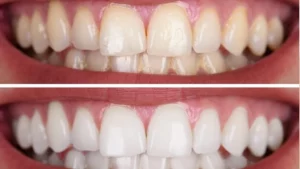Have you ever wondered if washing your mouth out with soap is harmful? This common practice, often seen in movies, raises important questions about its effects on your oral health. Using soap on your mouth might seem like a quick fix, but it’s essential to understand the potential risks involved. We’ll delve into the world of oral hygiene and examine Is Washing Your Mouth Out With Soap Harmful.
By learning about safer alternatives and best practices, you can make informed decisions about how to care for your oral well-being. Let’s uncover the truth behind the idea of washing your mouth out with soap.
The Risks of Washing Mouth with Soap
When it comes to the practice of washing your mouth out with soap, it’s important to consider the potential risks involved.
While this might seem like a straightforward way to clean your mouth, there are specific issues you should be aware of.
Read Also:Does Vaping Make Your Teeth Yellow?
Irritation and Dryness
Effects on Sensitive Oral Tissues Soap contains chemicals that can be harsh on the delicate tissues in your mouth.
When applied, these chemicals can lead to irritation and discomfort, causing your mouth to feel sore.
Disruption of Natural Moisture Balance The natural balance of moisture in your mouth plays a significant role in maintaining oral health. Using soap can disturb this balance, potentially causing dryness that leads to an uncomfortable sensation.

Chemical Exposure
Harsh Ingredients in Soap Many soaps are formulated for skin cleansing and may contain ingredients that are not intended for oral use.
These ingredients can be too strong for the sensitive environment of your mouth, potentially causing adverse reactions.
Potential Ingestion of Chemicals While washing your mouth, there’s a risk of accidentally swallowing soap or its residues.
Ingesting these chemicals can lead to digestive discomfort and might not be safe for your overall health.
Is Washing Your Mouth Out With Soap Harmful?
While the risks of washing your mouth out with soap are clear, there are certain situations where using soap on the mouth might be recommended.
It’s important to understand these instances and the precautions that should be taken.
Medical Recommendations
Instances Where Medical Professionals Might Advise Mild Soap Use In specific medical cases, such as severe bacterial infections or post-surgical care, healthcare providers might recommend using a very mild soap solution for limited oral cleaning. This is usually done under supervision to ensure safety.
Proper Dilution and Application Techniques If advised by a medical professional, it’s crucial to follow their instructions carefully.
Proper dilution of the soap and gentle application techniques can help minimize potential risks while addressing specific oral health concerns.
Read Also: Loose Gum Flap Between Teeth
Alternatives to Soap
Rinsing with Warm Water and Salt Instead of using soap, rinsing your mouth with warm water and a small amount of salt can help clean your mouth and maintain a healthier oral environment. This natural solution is less likely to cause irritation or unwanted side effects.
Over-the-Counter Mouthwashes There are specially formulated mouthwashes available at stores that are designed to promote oral hygiene.
These mouthwashes are created with ingredients that are safe for oral use and can help freshen your breath and maintain your mouth’s cleanliness.
Best Practices for Oral Hygiene
Maintaining proper oral hygiene is essential for overall health and well-being. By following these best practices, you can ensure that your mouth stays healthy and free from potential issues.
Regular Brushing and Flossing
Brushing Twice a Day Brush your teeth with a soft-bristle toothbrush at least twice a day, preferably in the morning and before bedtime.
This helps remove food particles and plaque buildup that can lead to cavities and gum disease.
Using Fluoride Toothpaste Choose a toothpaste with fluoride, as it strengthens tooth enamel and helps prevent decay. Use a pea-sized amount of toothpaste on your brush.
Proper Brushing Technique Hold your toothbrush at a slight angle and use gentle circular motions. Brush the front, back, and chewing surfaces of your teeth, as well as your tongue.
Flossing Daily Flossing removes plaque and food particles from between your teeth and along the gumline. Floss at least once a day using a gentle back-and-forth motion.

Visiting a Dentist
Regular Dental Check-ups Schedule regular dental visits every six months. Dentists can identify any potential issues early and provide professional cleanings to keep your teeth and gums healthy.
Personalized Oral Care Advice Dentists can offer tailored advice based on your oral health needs. They can recommend specific oral care products and techniques to address any concerns you may have.
Read Also: Can I Brush My Teeth After Tooth Extraction
Maintaining a Balanced Diet
Limit Sugary Foods and Drinks Reducing sugary snacks and beverages can help prevent tooth decay. If you do consume sugary foods, try to do so during meals to minimize the impact on your teeth.
Eating a Variety of Nutrient-Rich Foods A diet rich in fruits, vegetables, whole grains, lean proteins, and dairy products provides essential nutrients for strong teeth and gums.
Conclusion
In the world of oral hygiene, the practice of washing your mouth out with soap raises important considerations.
While this might seem like a simple solution, potential risks such as irritation, disruption of moisture balance, and exposure to chemicals highlight the need for safer alternatives. Medical guidance may warrant limited use of mild soap, but it’s essential to follow proper dilution and application techniques.
Embracing best practices for oral hygiene, such as regular brushing, flossing, and professional dental visits, remains key to maintaining a healthy mouth.
A balanced diet and reduced sugary intake contribute further to oral well-being. Remember, your mouth’s health is an integral part of your overall health.
FAQs
Can using soap on the mouth replace regular toothpaste?
No, regular toothpaste contains fluoride and is specifically formulated for oral hygiene. Soap lacks the same benefits and might introduce unnecessary risks.
Is washing the mouth with soap effective against bad breath?
Not necessarily, washing with soap might mask bad breath temporarily, but addressing the root cause through proper oral care is more effective.
Can soap help with gum disease?
Unlikely, gum disease requires targeted treatment from dental professionals. Soap doesn’t address the underlying issues.
Is there a safe soap for oral use?
Mild, unscented soaps might be considered, but consult a healthcare provider before trying any new method.
Can soap residue be harmful if swallowed?
Yes, soap contains chemicals not meant for ingestion. Swallowing soap residue can cause digestive discomfort.
Can using soap on the mouth cause allergies?
Possibly, some soap ingredients can trigger allergic reactions in sensitive individuals.
Is using soap a substitute for professional dental cleanings?
No, professional cleanings are essential to remove tartar buildup and assess oral health.
Can soap lead to dry mouth?
Yes, soap’s ingredients can disrupt the mouth’s natural moisture balance.
Can children use soap for oral hygiene?
Not recommended, children should use toothpaste with appropriate fluoride levels under adult supervision.
Medical References
- National Institute of Dental and Craniofacial Research. (2020). Oral Health and Overall Health. https://www.nidcr.nih.gov/sites/default/files/2020-09/oral-health-and-overall-health.pdf
- American Dental Association. (2020). Fluoride: Topical and Systemic Supplements. https://www.ada.org/en/member-center/oral-health-topics/fluoride-topical-and-systemic-supplements
- Mayo Clinic. (2021). Gum disease (periodontitis). https://www.mayoclinic.org/diseases-conditions/periodontitis/symptoms-causes/syc-20354473
- American Academy of Allergy, Asthma & Immunology. (2021). Contact Dermatitis. https://www.aaaai.org/conditions-and-treatments/conditions-a-to-z-search/contact-dermatitis
- American Dental Association. (2021). Mouthwash (Mouthrinse). https://www.ada.org/member-center/oral-health-topics/mouthrinse
- American Academy of Pediatrics. (2021). Brushing Up on Oral Health: Never Too Early to Start. https://www.healthychildren.org/English/healthy-living/oral-health/Pages/Brushing-Up-on-Oral-Health.aspx



